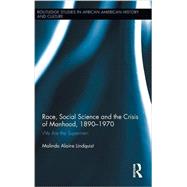Race, Social Science and the Crisis of Manhood, 1890-1970: We are the Supermen
, by Lindquist; Malinda Alaine- ISBN: 9780415517430 | 0415517435
- Cover: Hardcover
- Copyright: 4/12/2012
We need look no further than our local and national newspapers to see that black males are in a state of crisis in the United States. This book explains not only how we have come to tell the story of the young black male crisis, but examines the gender of the American social science tradition from its white male supremacist foundations. This is a story of pioneering black social scientists as much as it is a history of the changing perceptions, ideals, and shifting depictions of black and white manhood over nearly a century. Offering a fresh perspective on the history of ideas of black manhood, author Malinda Lindquist builds upon the foundational works of gender, intellectual, and African American historians, as well as literary critics, arguing that much of what we think we know about black men is a product of how the social sciences have explicitly informed and subtly molded how we as a nation approach and answer the question, "Who are men?" She conveys how black social scientists " theory of masculinist social change has been reduced over the decades from a wide-ranging political, cultural, scientific, and economic agenda to combat white male supremacy to an ever diminishing vision of the race crisis as a problem of the young black male that barely engages with the broader white male supremacist traditions of institutionalized violence, social injustice, and economic inequality. Until this masculinist social science tradition is replaced with a gender-neutral vision of democratic social change and a commitment to a radical equality of opportunity and outcome, we are likely to continue to identify black boys as the problem rather than as a provocative, masculinist, politically-potent symptom of the continuing significance of race and class in a troubled nation.







